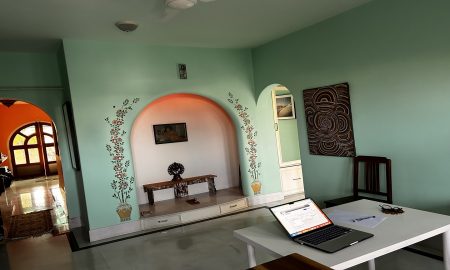 “Before I met you, south Indian people made me cringe.”
“Before I met you, south Indian people made me cringe.”
Just as my roommate uttered one of her most ignorant remarks to date, I bit into a scalding-hot taquito, singeing the roof of my mouth. It was an ice-cold February afternoon, which warranted a lazy Friday of cozying up to our mediocre dorm-room heaters, and microwaving frozen El Monterey taquitos.
“Why aren’t you saying anything?” She pursed her lips; a gesture she made often, especially in moments when she was worried she had crossed a line.
“Sorry the food is really hot.” I mentally scolded myself for apologizing. “But why would you ever feel that way to begin with?”
My family hailed from Kerala and my roommate was from Gujarat.
“So, whenever my parents forced me to come with them to Niagara Falls, I always noticed a ton of south Indian families huddled together. I could tell, you know, from their dark skin. Something about their frizzy hair just grossed me out. But—your hair is really silky, and your skin tone is pretty light—I can’t even tell you’re south Indian!”
I wish this particular anecdote ended with me shaking my fists in anger and putting my roommate’s blatantly disrespectful comments on blast, but instead, my college-freshman mind desperately sought out of the conversation. When we’d first moved in, we had pushed our twin beds to opposite walls of the room to free up as much floor space as possible. Now for the first time in the few months we had been living together, the space between us seemed too narrow.
Around two years later, a couple of my sorority sisters and I went clubbing for the first time at Suite 36, a two-storied nightclub located in Midtown West. The night had basically wound down for us; it was nearly two am, we had sobered up, and we were desperately craving pizza. I had just pulled my phone out to call an Uber when a random guy tapped me on the shoulder.
“Hey! Why aren’t you dancing? You look so bored!”
A few minutes of painful small talk ensued and then he revealed that he was from Tamil Nadu. When I told him that I was South Indian as well, he raised his eyebrows.
“No way! You’re light-skinned…and pretty! I thought you were North Indian.”
He was relatively light-skinned himself, and I was tempted to blurt out, “So you think you’re ridiculously attractive just because of your skin color?”
Once again, I chose the safe path of non-confrontation, though of course, the random NYC party-boy and I didn’t keep in touch.
These sentiments never failed to disturb me even though they came my way quite often. Many of my dark-skinned South Asian friends are met with unsolicited advice on how to lighten their complexion every time they visit relatives abroad. Hearing remarks on how they should have ‘stayed out of the sun,’ or ‘used a turmeric mask to remove dark impurities’ is particularly off-putting after an 18-hour flight. Corporations have taken advantage of this regressive mentality, offering skin-lightening products to a large consumer base across South and Southeast Asia. Marketing slogans carry subtle messages that light complexion denotes both beauty and success. The beauty industry already capitalizes on making people feel inferior for qualities they have been born with, not earned. It’s especially dangerous when skin color, the attribute that tyrants used as an excuse to enslave, rape and murder throughout history, is thrown into the mix.
A few months ago, my family and I attended an annual Onam celebration, hosted by members of our cultural community at Ridge High School, New Jersey.
Folk songs accompanied by the drumming of chendas reverberated from the auditorium, and the hallways were filled with people decked out in their finest white-set saris. I headed to a restroom to re-drape my own sari (I realized it was crooked) when I ran into my mother’s friend and her daughter.
“Manika! The sari looks so nice! This pleat is off though, let me fix it.”
She kindly re-tucked and pleated my outfit, and started asking me questions about what makeup products I used. I was in the midst of explaining to her how my acne-prone skin made makeup application frustrating, and how I only used oil-free foundation, when she cut me off:
“Oh, you are still so beautiful Manika! That’s barely an issue; your skin will clear up in no time. Anya over here has clear skin, but she’s always complaining about her skin color being too dark. Her friends are no better; they either complain as well, or brag. She wishes she had a fair complexion like you!”
Her daughter regarded me with a half-smirk and looked down. For the first time, I chose to respond to the backhanded compliment presented to me.
“Anya, do you seriously feel that way? Acne is an actual skin condition, it causes marks and blemishes, and I hate saying this, but I’d call it a flaw. But the color of your skin, that can never, ever, be a flaw. It’s like saying having dark skin is as bad has having a rash, and we both know how ridiculous that sounds! You’re beautiful, and your skin tone enhances only enhances your beauty further. ”
I’m not sure if my response was prompted by sour feelings building up over-time, or by the woman’s dismissal of a major insecurity of mine as “barely an issue”. I wasn’t exactly sure if my snippets of advice were even absorbed by Anya, who was a middle-school student, surrounded by friends who clearly exacerbated the toxic outlook around her.
What I can be certain of, however, is the necessity of speaking up. Complaining about internalized racism, or any archaic notion, to only like-minded and progressive individuals is far from effective. It was easy for me to vent to friends who empathized and confirmed my irritation, but it would have been far more impactful to directly address the people who’d articulated those insulting generalizations. It took multiple occurrences for me to finally speak my mind, and although it was uncomfortable, it was warranted.We need to encourage open, inclusive discussion in our societies and actually verbalize the issues that riddle us, or else they will never get a chance to heal.
My favorite author, Elif Safak, puts it simply “One should never, ever, remain silent for fear of complexity.”
A
A Series of Backhanded Compliments





